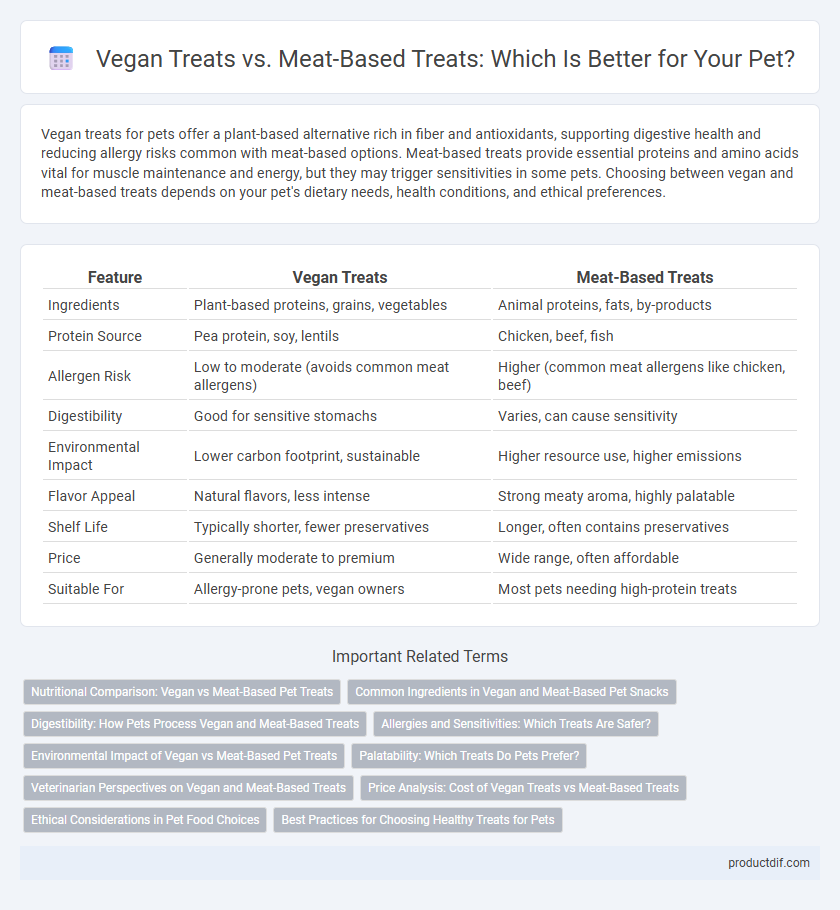Vegan treats for pets offer a plant-based alternative rich in fiber and antioxidants, supporting digestive health and reducing allergy risks common with meat-based options. Meat-based treats provide essential proteins and amino acids vital for muscle maintenance and energy, but they may trigger sensitivities in some pets. Choosing between vegan and meat-based treats depends on your pet's dietary needs, health conditions, and ethical preferences.
Table of Comparison
| Feature | Vegan Treats | Meat-Based Treats |
|---|---|---|
| Ingredients | Plant-based proteins, grains, vegetables | Animal proteins, fats, by-products |
| Protein Source | Pea protein, soy, lentils | Chicken, beef, fish |
| Allergen Risk | Low to moderate (avoids common meat allergens) | Higher (common meat allergens like chicken, beef) |
| Digestibility | Good for sensitive stomachs | Varies, can cause sensitivity |
| Environmental Impact | Lower carbon footprint, sustainable | Higher resource use, higher emissions |
| Flavor Appeal | Natural flavors, less intense | Strong meaty aroma, highly palatable |
| Shelf Life | Typically shorter, fewer preservatives | Longer, often contains preservatives |
| Price | Generally moderate to premium | Wide range, often affordable |
| Suitable For | Allergy-prone pets, vegan owners | Most pets needing high-protein treats |
Nutritional Comparison: Vegan vs Meat-Based Pet Treats
Vegan pet treats often provide high fiber content and essential vitamins from plant-based ingredients, promoting digestive health and reducing allergy risks compared to meat-based treats. Meat-based treats deliver complete proteins and essential amino acids crucial for muscle maintenance and overall vitality but may contain higher fat levels and potential allergens. Selecting vegan treats supports sustainable nutrition with lower cholesterol, while meat-based treats offer dense nutrient profiles favored for carnivorous dietary needs.
Common Ingredients in Vegan and Meat-Based Pet Snacks
Common ingredients in vegan pet treats often include peas, sweet potatoes, chickpeas, and flaxseed, providing essential plant-based proteins, fiber, and omega-3 fatty acids for pet health. Meat-based treats typically contain chicken, beef, or fish as primary protein sources, supplemented by animal fats, gelatin, and natural flavor enhancers to promote palatability and nutrient density. Both treat types may include vitamins, minerals, and preservatives to ensure balanced nutrition and shelf stability.
Digestibility: How Pets Process Vegan and Meat-Based Treats
Vegan treats often contain plant-based proteins and fibers that can be easier for some pets to digest, reducing the risk of digestive upset and promoting gut health. Meat-based treats provide essential amino acids and nutrients that align closely with carnivorous pets' natural diets but might sometimes cause sensitivities or allergies. Digestibility varies by pet species, individual tolerance, and the specific ingredients in each treat formulation.
Allergies and Sensitivities: Which Treats Are Safer?
Vegan treats often reduce the risk of common allergens like dairy, eggs, and certain meats, making them safer for pets with sensitivities or food allergies. Meat-based treats, while rich in protein, can trigger allergic reactions in pets sensitive to chicken, beef, or fish proteins. Choosing hypoallergenic vegan options can help minimize adverse reactions and support digestive health in pets with sensitivities.
Environmental Impact of Vegan vs Meat-Based Pet Treats
Vegan pet treats significantly reduce carbon emissions and water usage compared to meat-based options, contributing to lower environmental degradation. The production of plant-based ingredients demands fewer resources and generates less greenhouse gas, supporting sustainable pet care practices. Choosing vegan treats helps minimize the ecological footprint associated with the pet supply industry.
Palatability: Which Treats Do Pets Prefer?
Pets often show a higher preference for meat-based treats due to their strong aroma and natural flavor profile, which closely mimics their ancestral diet. Vegan treats, while increasingly formulated with palatable ingredients like nutritional yeast and natural flavor enhancers, sometimes lack the intense taste and smell that drives pet enthusiasm. Studies indicate that while some pets accept vegan treats, most exhibit a marked preference for the savory richness found in meat-based options.
Veterinarian Perspectives on Vegan and Meat-Based Treats
Veterinarians emphasize the importance of balanced nutrition in pet treats, often noting that meat-based treats provide essential amino acids crucial for carnivorous pets. Some veterinary experts express cautious support for vegan treats, provided they are fortified with necessary nutrients to prevent deficiencies. Clinical studies highlight that while vegan treats can be suitable for pets with specific dietary restrictions, meat-based options remain the preferred choice for promoting optimal health in most animals.
Price Analysis: Cost of Vegan Treats vs Meat-Based Treats
Vegan pet treats typically cost 15-30% more than meat-based treats due to higher prices of plant-based ingredients and specialized processing methods. Meat-based treats benefit from established supply chains and lower raw material costs, making them more affordable for pet owners on a budget. Price comparisons reveal that while vegan treats offer ethical and health benefits, their premium often impacts overall pet care expenses.
Ethical Considerations in Pet Food Choices
Vegan treats for pets eliminate the ethical concerns associated with animal cruelty and factory farming prevalent in meat-based treats. Choosing plant-based options supports sustainable farming practices and reduces the environmental impact linked to livestock production. Ethical pet owners prioritize treats that align with cruelty-free values while ensuring balanced nutrition for their pets.
Best Practices for Choosing Healthy Treats for Pets
When choosing healthy treats for pets, prioritize natural, nutrient-rich ingredients that align with your pet's dietary needs, such as protein sources from plants or high-quality meats. Vegan treats often contain essential vitamins and fiber from ingredients like sweet potatoes or peas, whereas meat-based treats provide complete proteins and amino acids critical for carnivorous pets. Always check for preservatives, artificial additives, and allergens to ensure the treat supports overall pet health and digestion.
Vegan Treats vs Meat-Based Treats Infographic

 productdif.com
productdif.com